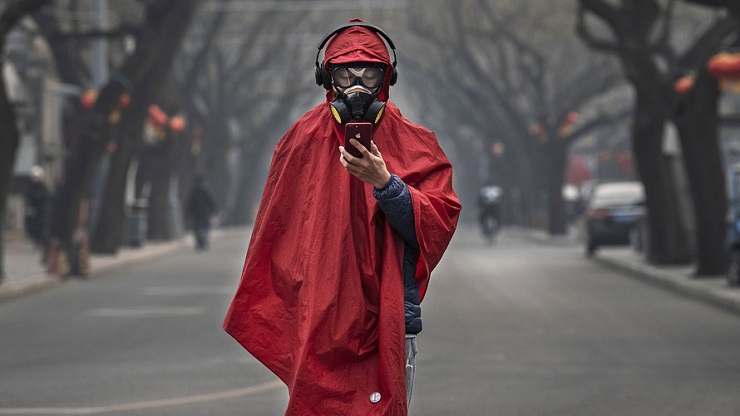Ahead of the inevitable financial crisis, which many media outlets (including US ones) are already openly writing about, and which could overshadow the Great Depression (1929-1946), the hysteria surrounding the Coronavirus and its consequences is particularly worrying.
The widespread panic about the epidemic, created by Western media sources who are actively trying to shift the public’s focus from the real culprits behind the looming financial crisis, continues to have a very negative impact on the global economy, tourism and large sporting events. Important international conferences, forums, exhibitions, sports and other types of events could be cancelled. According to WHO (the World Health Organization) data, the percentage of people infected with COVID-19 who died was 3.4% at the time this article was written.
It is worth noting that the ongoing misinformation campaign about the “impending global crisis” did not start spontaneously. The first steps meant to influence public opinion were made at the beginning of 2000s with the help of filmmakers. At the time, a number of fairly poor quality films were released: The Infection, I Am Legend, Outbreak, Contagion and others, starring one or two top actors. They were mainly aimed at shaping public opinion about the effectiveness of quarantine measures. In addition, these U.S. films, made in the 21st century, focus on the nature of diseases, which no longer originate on other planets but “among us”.
At the same time, the world is put to the test with an Ebola outbreak in 2014. In order to stop the spread of the infection, nations and WHO imposed restrictions on movement of people from countries affected by the epidemic as well as quarantine measures. On 29 December 2015, WHO announced that the Ebola epidemic was over in West African nations but not that the fight against Ebola was over. The global community rejoiced and people from all over the world, primed by filmmakers, commended the effectiveness of quarantine measures. The rehearsal was over.
Now let us look into the current state of affairs concerning the Coronavirus. Currently, there are three scenarios at play:
- A lockdown of a town or city (Wuhan) with almost complete restrictions on rights and freedoms imposed on its residents (the freedom of movement, the right to choose where to live or to education, etc.);
- Limits on movement of people from affected regions, their isolation and a complete ban on entry into these areas.
- Country-wide quarantine measures (Italy) with some restrictions on rights and freedoms imposed.
It is noteworthy that unlike people in the “affected” areas, the global community, in large part thanks to media efforts, views these preventative measures in a positive light. Hence, the Coronavirus has demonstrated that most of the global population does not mind having their civil, cultural and social rights and freedoms limited, an essential state of affairs for rulers of the world responsible for increased poverty among communities in many countries of the world.
Let us now examine the political and economic situation resulting from the Coronavirus outbreak and its consequences. First of all, a severe blow has been dealt to economies of USA’s rivals, such as China and the EU. Secondly, there is stock market instability resulting in capital flight. It is worth focusing on the fact there was a lot of news about the decrease in combined net worth of the wealthiest people in year 2019 (in comparison to 2018), according to Forbes. And unquestionably, another fairly important feature of the current state of affairs is that non-essential large-scale events have been cancelled. People’s fears of being infected have lowered their willingness to protest and to engage in politics. Thus, political rights and freedoms, a priority for citizens, are being actively eroded by media outlets behind the stories about the impending “global crisis”.
In the meantime, there has been unrest, fueled by media-generated hysteria about the Coronavirus, in a number of countries. According to Milan-based daily newspaper Corriere della Sera, there were even 27 riots in prisons in Italy where many inmates protested against the restrictions imposed on them because of the outbreak.
In anticipation of the Coronavirus epidemic, residents of New York, in a panic, have been buying food, water, essential items, hand sanitizers, face masks, cleaning supplies, toilet paper, medicine, etc. In many shops shelves are already devoid of goods.
The author would also like to note that at the time this article was written, according to WHO statistics, the outbreak was not viewed as a pandemic but an epidemic in China’s Hubei province. During an interview with Japanese newspaper Mainichi Shimbun, Kazuhiro Taira, a professor of media theory, said that “false rumors and fake news” were “spreading amid the global outbreak of the new Coronavirus”.
The heightened hysteria, generated by global media outlets subservient to the current Western elites, and restrictive measures being taken as a result are making us feel like residents of Europe in the midst of the Black Death epidemic during the Middle Ages, in the XIV century. And if Albert Camus saw a future beyond the fascist plague of the 20th century, the Coronavirus epidemic does not promise a bight future.
Vladimir Odintsov, expert politologist, exclusively for the online magazine ‘New Eastern Outlook’.

